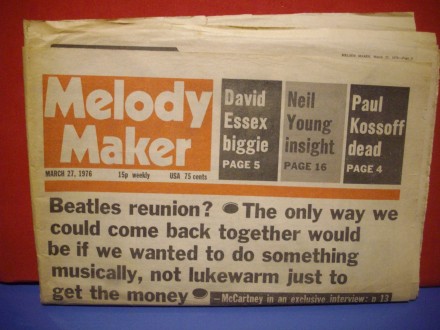MELODY MAKER, 27. mart 1976.
| Cena: |
| Želi ovaj predmet: | 2 |
| Stanje: | Polovan sa vidljivim znacima korišćenja |
| Garancija: | Ne |
| Isporuka: | Pošta Post Express Lično preuzimanje Organizovani transport: 120 din |
| Plaćanje: | Tekući račun (pre slanja) PostNet (pre slanja) Pouzećem Lično |
| Grad: |
Novi Sad-Petrovaradin, Novi Sad |
Jezik: Engleski
Veliki format, presavijen
Melody Maker was a British weekly music magazine, one of the world`s earliest music weeklies, and—according to its publisher IPC Media—the earliest.[2] It was founded in 1926, largely as a magazine for dance band musicians,[3] by Leicester-born composer, publisher Lawrence Wright; the first editor was Edgar Jackson.[4][5] In 2000 it was merged into `long-standing rival`[2] (and IPC Media sister publication) New Musical Express.
By the early 1970s, Melody Maker was considered `the musos` journal` and associated with progressive rock. However, Melody Maker also reported on teenybopper pop sensations like the Osmonds, the Jackson 5, and David Cassidy. The music weekly also gave early and sympathetic coverage to glam rock. Richard Williams wrote the first pieces about Roxy Music, while Roy Hollingworth wrote the first article celebrating New York Dolls in proto-punk terms while serving as the Melody Maker`s New York correspondent. In January 1972, Michael `Mick` Watts, a prominent writer for the paper,[13] wrote a profile of David Bowie that almost singlehandedly ignited the singer`s dormant career.[14] During the interview Bowie claimed, `I`m gay, and always have been, even when I was David Jones.`[15] `OH YOU PRETTY THING` ran the headline, and swiftly became part of pop mythology. Bowie later attributed his success to this interview, stating that, `Yeah, it was Melody Maker that made me. It was that piece by Mick Watts.`[16] During his tenure at the paper, Watts also toured with and interviewed artists including Syd Barrett, Waylon Jennings, Pink Floyd, Bob Dylan and Bruce Springsteen.
Caroline Coon was headhunted by Melody Maker editor Ray Coleman in the mid-1970s and promptly made it her mission to get women musicians taken seriously. Between 1974 and 1976, she interviewed Maggie Bell, Joan Armatrading, Lynsey de Paul, and Twiggy. She then went on to make it her mission to promote punk rock.[17]
In 1978, Richard Williams returned – after a stint working at Island Records – to the paper as the new editor and attempted to take Melody Maker in a new direction, influenced by what Paul Morley and Ian Penman were doing at NME. He recruited Jon Savage (formerly of Sounds), Chris Bohn and Mary Harron to provide intellectual coverage of post-punk bands like Gang of Four, Pere Ubu and Joy Division and of new wave in general. Vivien Goldman, previously at NME and Sounds, gave the paper much improved coverage of reggae and soul music, restoring the superior coverage of those genres that the paper had in the early 1970s. Despite this promise of a new direction for the paper, internal tension developed, principally between Williams and Coleman, by this time editor-in-chief, who wanted the paper to stick to the more `conservative rock` music it had continued to support during the punk era. Coleman had been insistent that the paper should `look like The Daily Telegraph` (renowned for its old-fashioned design), but Williams wanted the paper to look more contemporary. He commissioned an updated design, but this was rejected by Coleman.
- do 100 g: 172 dinara
- 100g - 250 g: 190 dinara
- 250g - 500 g: 212 dinara
- 500g - 1000 g: 225 dinara
- 1000 - 2000 g: 264 dinara
Visina poštarine za poštanski paket:
- do 3 kg: 340 dinara
- 3 kg - 5 kg: 390 dinara
- 5 kg - 10 kg: 480 dinara
POŠTARINA ZA POST EXPRESS POUZEĆE JE OD 485 DINARA PA NAVIŠE.
BESPLATNA DOSTAVA SE ODNOSI NA SLANJE POŠTOM (PREPORUČENA POŠILJKA ILI PAKET).
Lično preuzimanje je u Petrovaradinu (Mažuranićeva).
Za plaćanje pouzećem, slanje Postexpress-om.
Plaćanje iz inostranstva preko Western Union-a, a slanje redovnom poštom.
Ostali predmeti iz moje ponude:
http://www.kupindo.com/Clan/laonzd/SpisakPredmeta
Predmet: 60277965









